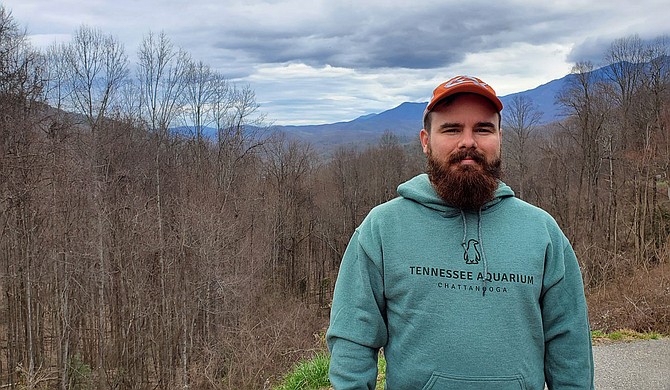How many teachers do you know whose wedding rings were brought to them by a turtle? Justin Cummins, a biology teacher at Richland High School, developed his appreciation for teaching his chosen field through a combination of his own educational background and his work with animals prior to becoming a teacher.
The Vicksburg native was a first-generation college student, graduating from Hinds Community College with a bachelor’s degree in marine biology and a minor in chemistry before attending the University of Southern Mississippi, where he earned his master’s degree in secondary teacher education.
Cummins worked for Auburn University in Alabama as an environmental educator and later at the University of Alabama in Birmingham in a lab studying cells and working on cancer research. When his wife, whom he met at USM, enrolled in medical school at the University of Mississippi Medical Center, Cummins solidified the career path he wanted to take and accepted a teaching position at Ridgeland High School.
“Teaching and education is something that has always inspired me, and now, having that relationship with my students where they can ask me for help and I get to help guide them means the world to me,” he says.
At Richland, Cummins instructs classes in biology—a subject that Mississippi tests state-wide—as well as marine and aquatic science. He says that marine biology was his first academic passion and that he feels very blessed to be able to share the field with his students.
“I love when the kids get into it. My classes are a lot of fun. My favorite class would have to be marine biology—we dive into various freshwater and saltwater ecosystems, but really we focus on major concepts such as pollution and prices of the big water industries,” he says.
Cummins emphasizes that getting the bigger picture across to students when learning these concepts is important, as it helps them formulate questions and logically answer them.
“We do a lot of opinionated discussion. I love to see the conversation develop and to help them understand what they can do to help make a change,” he says.
Cummins notes that his previous jobs contribute to his classes, as he gets to present firsthand experiences to his classrooms that correlate with the topics they are discussing. His time working with cells at the UAB research lab helps him when teaching cell division and cancer, whereas his work at Auburn as an environmental educator and animal caretaker helps him teach about living animals.
“We took care of about a little less than 20 birds of prey and then quite a few reptiles. We were always outside and doing fun things with the kids,” he says. Walter, one of the turtles he took care of at Auburn, was the turtle who served as his ringbearer.
Along with his background working in labs and taking care of animals, his transition into teaching was made more smooth thanks to the people he works with at Richland.
“I have really great co-workers that help me put together awesome lessons. We bounce ideas off of each other all the time,” he says.
Thus far, Cummins has found teaching to be a worthwhile experience.
“Everyday teaching is a new challenge and is so exciting. I really love that about my job,” he says. “There’s such a huge need for teachers, and in my opinion, alternative route teachers as a whole are sometimes a little bit better suited just because there’s usually more life experience. All of my mentors and other co-teachers are also alternative route teachers who are really smart and do so well in their subjects.”
He owes his positive perspective on teaching to Richland High School itself.
“I love Richland. I love that it’s a title school. It means a lot to me to be able to help and make a difference in these kids' lives,” he says. “They’re the first thing I think about when I get up and the last thing I think about when I go to bed.”



Comments
Use the comment form below to begin a discussion about this content.